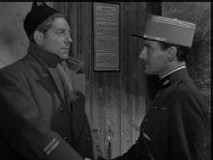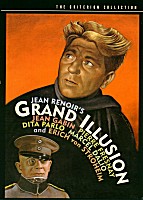![[Deep Focus]](../../../flicker/dvd/logo.gif) |
|||
|
GRAND ILLUSION |
|
Directed by Jean Renoir Written by Renoir and Charles Spaak Cinematography by Christian Matras Edited by Marguerite Houllé Starring Jean Gabin, Pierre Fresnay, Erich von Stroheim, and Marcel Dalio France, 1938
| |
|
Grand Illusion, Jean Renoir's great meditation on human relationships and the absurdity of territorial struggles, is one of those films that demands repeat viewings. Stylistically, it's a marvelous example of classical cinema technique. It's often mentioned in the same breath with Citizen Kane (Welles is known to have held Grand Illusion in singularly high esteem), yet the two films could hardly be more different from one another. While Citizen Kane is all about radical camera angles, showboating special effects, and the multiplicity of narrative, Grand Illusion is about mise en scène (including the sort of deep-focus photography for which Kane would get all the credit), theatrical technique, and quietly heartbreaking performances. One dissolve spans so much key action that contemporary viewers may be disoriented -- this film comes from an age when a dissolve really meant something. And finally, like all great films, this is one that you don't watch so much as you live in for a while.
In his audio commentary on the new Criterion Collection DVD of the film, scholar Peter Cowie reads the story as a romance between Rauffenstein and Baldieux, both of them aristocrats. (Marechal, the film's real protagonist, is more or less ignored by Rauffenstein because of his lower-class origins.) That begins to get at Renoir's extraordinary accomplishment, building a network of relationships that illustrate how humanity can endure in the face of war. I'm reluctant to say more for fear of spoiling any first-time viewer's experience. Suffice it to say that the film's defining events bemoan the kind of nationalist pride that sets men at each others throats. Renoir clearly believed that compassion crosses any lines drawn on maps, and made Grand Illusion as testimony to that ideal. The great illusion here is war, yes -- borne from the illusory boundaries that separate countries, and from the misguided assumption that by taking up arms against our neighbors we will eventually put things right. (Like Abel Gance, who made two different versions of J'Accuse in futile protest against two different world wars, Renoir later lamented the fact that the release of such a film has no bearing whatsoever on the world's propensity to go to war.)
DVD GRADE: A The Criterion disc bears the spine number 1, and early adopters may remember that this title was slated to be the longtime laserdisc publisher's debut on the DVD market way back in early 1998. A funny thing happened on the way to that release, however, and the Criterion team wound up securing the film's long-missing original camera negative. A new fine-grain master was made, which begged for a theatrical reissue (through Rialto Pictures) and video restoration (in collaboration with the French company Canal+) which, in turn, delayed the film's eventual arrival on DVD. (Such a move is not unheard of -- Walkabout and Picnic At Hanging Rock both enjoyed new theatrical engagements as part of their rehabilitation for Criterion editions.) Happily, the resulting disc is well worth the wait. The image is crisp and clean, with a rich tonal quality that approximates a good 35mm print. (There's a hint of digital artifacting -- likely caused by fine film grain -- in the background of a few scenes, but it's not distracting.) As we've come to expect from Criterion, this disc is now the definitive version of the film, with a sharp new subtitle translation and a raft of supplements. Included is the aforementioned running commentary, which is engaging and highly informative (how else would a guy like me learn that composer Joseph Kosma cribbed part of his score from Stravinsky's First Symphony?), as well as an intriguing trailer for the film's 1958 reissue featuring an introduction by Stroheim himself. Another intriguing feature is the original radio broadcast of Renoir and von Stroheim accepting the Best Foreign Film award from the New York Film Critics. Also included are excerpts from the press notes for last year's reissue, as well as a look at Grand Illusion through the ages -- we see the original 1958 element, then the cleaned-up version of that element that Criterion released on laserdisc 13 years ago, and finally the current video transfer made from the new fine-grain master. The puzzling bit for me is the absence of Renoir's letter to the projectionist, promised on the disc's box. I can't figure out if it's hidden on the disc somewhere, or if it's a separate card that went missing from my package. (If the latter, please, let me know.) As usual, the menu design is simple but effective -- no cheesy explosions or animated von Stroheim figure here, thank you very much -- and the packaging is elegant. The disc was produced by Criterion's Fumiko Takagi, and belongs in any serious filmwatcher's core DVD library.
| |||
| |||

| |||


 http://www.deep-focus.com/flicker/
bryant@deep-focus.com
http://www.deep-focus.com/flicker/
bryant@deep-focus.com